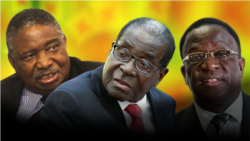Some experts say Zimbabwe’s constitution is inadequate in addressing President Robert Mugabe’s succession.
They argue that with serious factionalism ravaging the former liberation movement, the Speaker of Parliament can end up several nominees for the presidential post if President Mugabe is incapacitated or dies in office.
While the position of the succession of the President may appear clear in terms of the constitution, experts say divisions and serious infighting the ruling Zanu PF party could lead to a chaotic succession process if he dies, resigns or is removed from office
According to section 101 of the Constitution, if the president dies, resigns or is removed from office, the first vice president assumes office as president until the expiry of the former president’s term.
This section is, however, suspended until 2023. According to the Sixth Schedule of the Constitution, which covers the first 10 years of the constitution, if a president dies, resigns or is removed from office, the vice-president who was last nominated to act as president automatically becomes acting president for 90 days.
During the period, the ruling party must nominate a person to become President after the 90 days.
According to the Sixth Schedule Section 14, subsection 5, a political party which is entitled to nominate a person in terms of subparagraph (4) (b) must notify the Speaker of the nominee’s name within 90 days after the vacancy occurred in the office of the president, and thereupon the nominee assumes office as president after taking the oath of president in terms of Section 94, which oath the nominee must take within 48 hours after the Speaker was notified of his or her name.
University of Zimbabwe law lecturer, Professor Lovemore Madhuku, says the constitution is problematic because it doesn’t define what Zanu PF or the ruling party is.
He says given the divisions in Zanu PF, the Speaker could end up having many nominees for the post of president.
“The only problem which the constitution creates is that it doesn’t define who the ruling party is, it doesn’t says it must be the executive committee of that party, leader or congress so you can actually receive hundreds of letters,” says Madhuku.
He says that allows the other contestants to approach the courts either to block that person from being sworn in or challenge that person’s ascendency to office.
Douglas Mwonzora, opposition Movement for Democratic Change, secretary- general, who is a lawyer and one of the drafters of the constitution, admits that they never anticipated that the appointment of a substantive president could be rendered impossible by dysfunctional factional politics.
“What we did not foresee when we were drafting the constitution is a situation where the party which is ruling is divided into two or more factions which are equally powerful. The question is which function supplies the name for example the G40 (Generation 40) may supply a name and then the next minute the Lacoste team supplies an name, the drafters of the constitution did not envisage that situation,” says Mwonzora.
Zimbabwe Human Rights NGO Forum director, Lloyd Kuvheya, says clearly points to chaotic succession process.
For me really, if the president does not control, factionalism, the infighting that is currently going on within his party, we are going to have chaos on our hands especially if the president in no longer in power as a result of death,’” says Kuvheya.
Professor Madhuku, concurs, adding that the best way for the country would be amend the constitution as soon as possible. He says that when the president dies there is an acting president and Zimbabwe goes to a by-election to elect a substantive president.
Mwonzora shares the same sentiment saying it’s not too late and Zimbabweans must make this a top priority.
“The public should agitate for a clear succession plan and this can be done through an act of parliament which clarifies a grey constitutional area is not unconstitutional. So, there must an act of parliament now which deals with a situation where the supply of a President by a factious party is impossible,” says Mwonzora said.
But Zanu PF member who worked with Mwonzora in drafting the constitution, Paul Mangwana, says Zanu PF is one party and there was no way it would provide many candidate for the presidency.
Zanu PF activist, Oswald Tapona, while admitting the current factional fighting in the ruling party, believes there will be a smooth transition.
“The Constitution is clear, it says that if the president dies or is incapacitated, the last acting president will take over will take over for 90 days then the concerned party, in this case Zanu PF will hold a congress where they will chose their candidate to represent the party, so in this case Zanu PF is one there won’t be any problem,” says Tapona.
But whichever way it goes, political commentator and Media Centre director Ernest Mudzengi, says the succession process will be manipulated especially by the military.
“As I see it the person who may have been the last acting president may actually take advantage and consolidate power in this current scenario,” he says.
But Kuvheya believes that the military is unlikely to do anything to upset the structure of power.
Two southern African countries, Zambia on two occasions, and Malawi have witnessed smooth successions following the death of sitting presidents.
Zimbabwe has had one leader, President Mugabe, since independence from British rule in 1980.






